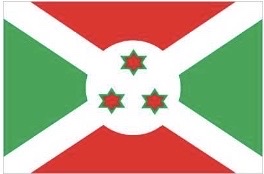Wars and Conflicts of Burundi
Burundi is a small African nation with a high population density and a lot of poverty. The population is divided between two main ethnic groups: the Hutu and the Tutsi. The Hutu form about 85% of the populace, while the Tutsi, with about 14%, form a small but politically and economically powerful minority. Burundi’s military history is filled with ethnic conflict and a genocide between the Burundian Tutsi and Hutu.
Below is the military history of the wars and conflicts of Burundi after independence from Belgium in 1962.
Burundi Coup Attempt (1965)–Burundi was ruled by a king after independence from Belgium. On October 18, 1965, a coup took place that attempted to overthrew the ethnic Tutsi king. The Hutu rebels were defeated by Tutsi forces loyal to the king, and began a massacre that lasted several weeks in which hundreds of Hutu military, police, and political leaders were killed. Hutu militants attacked Tutsi villages in the Muramvya region, sparking military retaliation that resulted in at least 5,000 deaths. All this occurred in an atmosphere of confusion, as rumors spread as to who had done what to whom, with parts of both factions claiming loyalty to the king.
Burundi Ethnic Warfare (1972)-In April of 1972, the exiled Burundian King Ntare V returned to Burundi, and was promptly arrested and executed. This sparked a confusing series of events that led to bloody upheaval and genocide undertaken by forces loyal to President Michel Micombero (a Tutsi). On April 27, 1972, in towns of Rumonge and Nyanza-Lac local Hutu police declared martial law, whereupon his forces began massacring large numbers of Hutu. This sparked an invasion of Burundi by Burundian Hutu rebels (based in eastern Zaire) and their allies, the Zairean Mulilist rebel militia. In part due to the Mulilist participation in the fighting, the Zairean dictator, Mobutu Sese Seko, sent several hundred troops to Bujumbura to aid the Burundi government.
The Burundi army, in conjunction with Tutsi militia forces, rounded up nearly every educated Hutu in the country and murdered them. It is believed that nearly 200,000 died in this genocide.
Burundi Coup (1976)– Deputy Chief of Staff Jean-Baptiste Bagaza overthrew his distant cousin, President Micombero.
Burundi Coup (1987)–The 1987 Burundi coup d’état was a bloodless military coup d’état that took place in Burundi on September 3,1987. President Jean-Baptiste Bagaza, a member of the Tutsi minority, was deposed while overseas at a conference in Canada. The leader of the coup was a fellow Tutsi, army Major Pierre Buyoya. One result of this change of administrations was further ethnic violence between Tutsi and Hutu.
Burundian Civil War (1993-2005)-Sparked by the assassination of the elected Hutu president, Melchior Ndadaye, by Tutsi assassins, ethnic violence escalated, resulting in thousands of deaths as Hutu peasants attacked the Tutsi, and Tutsi-dominated institutions . His successor, fellow Hutu Cyprien Ntaryamira, died when the plane he was flying in with the Hutu president of Rwanda (a neighboring nation with similar ethnic divisions), was shot down in the Rwandan capital of Kigali. This dual assassination sparked full-fledged civil war in both nations and the twin Rwandan and Burundian genocides in which hundreds of thousands died in each nation. See also: Civil Wars of Rwanda.
First Congo War (1996–1997)-The first of two devastating wars in the Congo (formerly called Zaire), drew in many other African nations, including Burundi, who participated in a minor way, primarily allied with Rwanda.
Second Congo War (1998-2003)-Burundi joined with Rwanda and Uganda in supporting eastern Congo rebels against the Congo government, which was supported by Angola, Zimbabwe, Chad, Namibia, and several Burundian rebel groups that operated in eastern Congo. This conflict is also referred to as The Great Lakes War and as Africa’s Great War.
Kivu Conflict (2004-2009)-War in eastern Congo (Kivu region), involving many of the same nations and groups involved in the Second Congo War. Burundi’s involvement largely due to the ongoing fight against Burundian (Hutu) rebels based in eastern Congo.
Somalia War (2009-Present)-Burundi joined the African Union Mission to Somalia (AMISOM) military force that is actively fighting against the Somali Islamic militant force known as al-Shabab. Al-Shabab is now an affiliate of al-Qaida. Burundi’s participation in this war (as of 2015, over 5,000 Burundian troops are in Somalia), is part of the American-backed assistance to the weak Somali government. By 2023, hundreds of Burundian troops have died in combat in Somalia. Participation in this war has helped Burundi in several ways. Deployment to Somalia provides work for Burundi’s large number of veteran soldiers in the aftermath of the civil wars and Congo expeditions, as well as helping serve as a focus for the nation to look past the internal Tutsi/Hutu split. Also, the intervention in Somalia has a positive effect on Burundi’s economy, as earns a United Nations salary of $750 a month, which is far and away an improvement over the $20 a month earned by a soldier stationed at home. Veterans of the Somalia War are now becoming a growing part of the Burundi middle class.
Burundi Coup Attempt (2015)– An attempt to overthrow the incumbent president of Burundi, Pierre Nkurunziza, ended in a failed coup and confusion as to whether or not the military mutineers had foreign backing. While President Nkurunziza was visiting neighboring Tanzania, military officers attempted to seize power in Burundi. Troops and police loyal to the government resisted the mutineers, resulting in nearly two days of fighting in the capital city of Bujumbura. Major General Godefroid Niyombare was the leader of the coup. While the president was out of the country, Niyombare’s forces launched the attempted takeover on May 13, and General Niyombare declared on the radio that the president was overthrown. Recent political events led to tension in Burundi. President Nkurunziza’s decision to seek a third term, despite a constitutional limit of two terms, caused significant controversy in Burundi. Added to that were accusations that the president’s administration was corrupt only heightened the ill feelings toward him in some parts of Burundian society.
Both President Nkurunziza and General Niyombare are Hutu.

